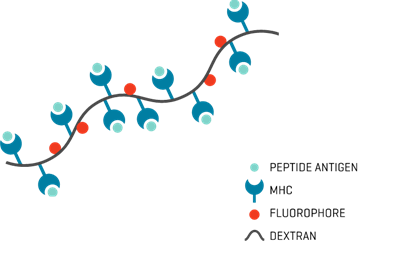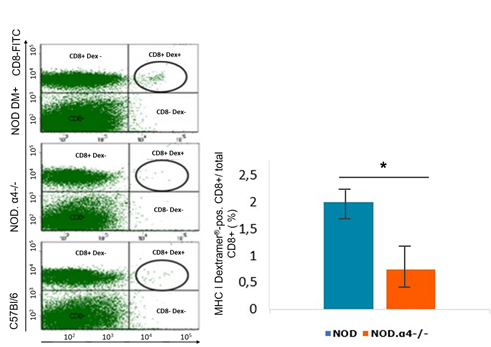Get the case study as a PDF.
Novel Insights Into Diabetes and Adaptive Immunity Provided by the α4-Integrin Deficient NOD Mouse
Background
Autoimmune type 1 diabetes (T1D) is a complex autoimmune disease characterized by the destruction of the insulin-producing β-cells in the pancreas.
In this prospective study, researchers studied the role of α4 (CD49d) hematopoietic integrin in T1D, using newly generated non-obese diabetic (NOD) α4 knock-out mice (NOD.α4-/-) as a model. NOD mice exhibit spontaneous development of autoimmune T1D due to insulitis, an inflammation of the islets of Langerhans in the pancreas.

Study Description
Goal: Evaluate the contributions of α4-integrin to autoimmune diabetes using NOD.α4 knock-out mice and adoptive T-cell transfer experiments.
Mice from three different cohorts (pre-diabetic NOD, diabetic NOD, NOD.α4-/-) were assessed for adaptive cellular and humoral immune responses against islet autoantigens and subjected to microbiota analyses. Diabetes was diagnosed based on recurrent hyperglycemia (blood glucose level >200 mg/dL).
MHC I Dextramer® H-2Kd/VYLKTNVFL (from islet-specific glucose-6-phosphatase catalytic subunit-related protein, IGRP) was used for detecting IGRP-autoreactive T cells by flow cytometry. For negative control, the same staining with leukocytes from MHC-disparate C57Bl/6 mice was performed.
Results
- NOD.α4-/- mice were completely protected from autoimmune diabetes
- NOD.α4-/- mice developed islet-specific T-cells and antibodies, albeit quantitatively less than α4+ counterparts (Fig.1)
- Transplantation with isogeneic α4-/- bone marrow prevented progression to T1D of pre-diabetic NOD.α4+ mice despite significant pre-existing islet cell injury
- Transfer of α4+/CD3+, but not α4+/CD4+ splenocytes from diabetic to NOD.α4-/- mice, induced diabetes with short latency
- Microbiota of diabetes-resistant NOD.α4-/- and pre-diabetic NOD.α4+ mice were identical and are distinct from diabetic NOD mice.

Fig. 1. Diabetes and adaptive immune responses against islet antigens. MHC I Dextramer® H-2Kd/VYLKTNVFL binding to CD8+ T cells was assessed by flow cytometry.
Representative dot plots for NOD, NOD.α4-/- and MHC-disparate C57Bl/6 (negative control) mouse blood (left) and quantitative analysis (right), where Dextramer®-positive events in negative control blood were subtracted as background (n = 9 per group; p < 0.05).
Conclusions
- “NOD.α4-/- mice are diabetes resistant despite developing adaptive immunity, albeit attenuated, against islet autoantigens”
- α4 is a promising target for primary or secondary prevention of human type 1 diabetes
- MHC I Dextramer® is a sensitive tool that can be used for the detection and enumeration of islet-specific autoreactive T cells in mouse model
- MHC I Dextramer® reagents can support and advance scientific discoveries in autoimmunity.

